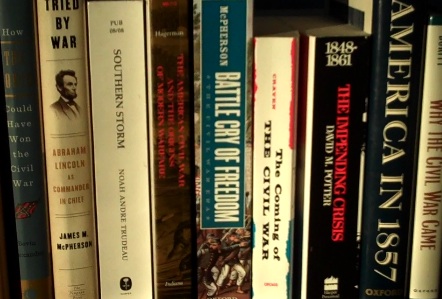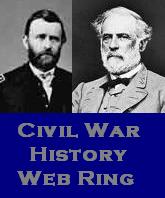Archive for December 16th, 2007
Exploring Causes of the Civil War – Part VI: The Contribution of Constitutional Ambiguity
This post continues a series on Exploring Causes of the Civil War. Other posts can be read by clicking on any of the following links: Part I: Introduction, Part II: Antebellum America, Part III: The Antebellum South, Part IV: The Antebellum North, and Part V: The Rise of Sectional Disputes.
___________________

 Historian Gabor S. Boritt asserts that the American Constitution’s “fundamental ambiguity” on a number of matters involving slavery contributed to the sectional controversy that stimulated the growing conflict between the North and the South.[i] The document was vague on the status of slavery in the territories, the power of Congress over the institution in the District of Columbia, whether the power of Congress to regulate interstate commerce extended to the slave trade, whether it was a state or federal responsibility to return runaway slaves, and whether Congress could impose conditions on a new state or refuse to admit a new slave state to the Union.[ii] But the most important of these was whether a state had the right to secede from the Union.
Historian Gabor S. Boritt asserts that the American Constitution’s “fundamental ambiguity” on a number of matters involving slavery contributed to the sectional controversy that stimulated the growing conflict between the North and the South.[i] The document was vague on the status of slavery in the territories, the power of Congress over the institution in the District of Columbia, whether the power of Congress to regulate interstate commerce extended to the slave trade, whether it was a state or federal responsibility to return runaway slaves, and whether Congress could impose conditions on a new state or refuse to admit a new slave state to the Union.[ii] But the most important of these was whether a state had the right to secede from the Union.
Whereas the Articles of Confederation had proclaimed the Union to be perpetual, the Constitution contained no such statement. Indeed, nowhere did it discuss whether a state could secede or not. In the absence of any explicit provision, neither the nationalists nor the secessionists could present a conclusive argument on the subject. In upholding the perpetuity of the Union, Abraham Lincoln conceded that the language of the Constitution was not decisive.[iii]
This didn’t stop either side from finding in these documents justification of their positions.
Topic of the next post: Political Discord, Slavery, and the Fight for Political Control.
© 2007 L. Rene Tyree
[i] Gabor S. Boritt, “‘And the War Came’? Abraham Lincoln and the Question of Individual Responsibility,” in Why the Civil War Came, ed. Gabor S. Boritt [book on- line] (New York: Oxford University Press, 1996, accessed 1 September 2007), 85; available from questia.com http://www.questia.com/PM.qst?a=o&d=78779127; Internet.
line] (New York: Oxford University Press, 1996, accessed 1 September 2007), 85; available from questia.com http://www.questia.com/PM.qst?a=o&d=78779127; Internet.
[ii] Ibid.
[iii] Ibid.
My Love-Hate Relationship with Ebooks
 A short post as I peruse the “ebrary” tool available to me as a graduate student. I am in search of a good text to read and about which to write an academic book review. It’s an assignment in my Historiography class. I’m open for suggestion by the way.
A short post as I peruse the “ebrary” tool available to me as a graduate student. I am in search of a good text to read and about which to write an academic book review. It’s an assignment in my Historiography class. I’m open for suggestion by the way.
I absolutely LOVE the ability to search, read, highlight and store on my virtual bookshelf the books on-line in virtual libraries. Before I discovered that I had access to “ebrary,” a wonderful tool at the university, I used (and still do) Questia. I am admittedly an e-library “early-adopter” (a term we use in telecom to describe those on the cutting edge who can’t wait for the latest new technology and will pay a premium to have it). Yes I actually pay a hefty sum for my Questia subscription. Now that I’ve seen “ebrary,” I will likely reconsider, but I digress. The point is that for research and easy, quick access to information, ebook libraries are fantastic. I can highlight in multiple colors, build bookshelves on particular topics, create perfectly formatted citation s in the style of my choosing —sigh — a student’s or any researcher’s dream.
s in the style of my choosing —sigh — a student’s or any researcher’s dream.
On the other hand, I LOVE to OWN books. I want them all – physically in my house, on my shelves, stacked on my desk, on the floor, the dresser, the nightstand (See earlier post titled Civil War Books Filling Every Nook and Cranny.). I want to be able to pick a book up, feel it in my hands, flip through its pages, highlight phrases I want to remember, scribble in the margins, carry it in my bag to pull out during moments opportune for reading. This tactile experience – which is one of the joys of reading – is just not the same with an ebook.
I’ve been vaguely aware of the ebook readers on the market. One of my staff told me that the new “AmazonKindle” is all the rage in academia. Could this be the best of both worlds? I’m not yet ready to say. I guess I need to try it, but, alas, it has no pages to touch… I remain conflicted.















































